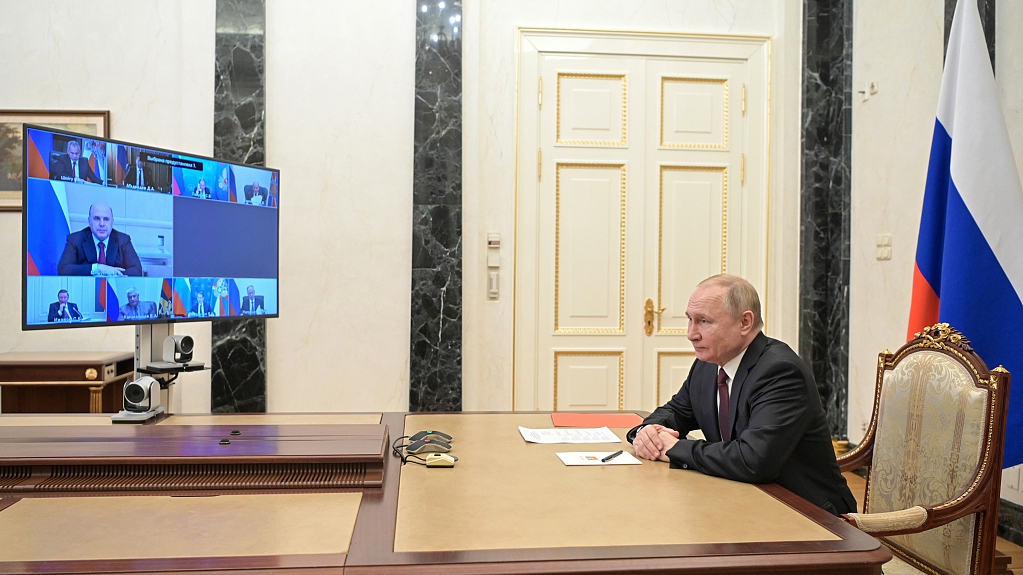
People take shelter in a subway station in Kyiv, Ukraine, February 25, 2022. /Xinhua
People take shelter in a subway station in Kyiv, Ukraine, February 25, 2022. /Xinhua
Editor's note: Keith Lamb is a University of Oxford graduate with a Master of Science in Contemporary Chinese Studies. His primary research interests are China's international relations and socialism with Chinese characteristics. The article reflects the author's opinions and not necessarily the views of CGTN.
We usually envisage hegemony as the ability to dominate with hard power, often through military or economic coercion. However, there is another aspect of hegemony that is the ability to dominate the narrative and control perceptions. Here, "hard" and "soft" hegemony reinforce each other. Narratives that justify hard actions lack self-reflection as well as empathy with other actors' interests and the complexities of international relations are condensed into a "good" versus "evil" stratagem where "horrible men do horrible things because they don't like our horrible freedoms."
In the case of Iraq, lies about weapons of mass destruction justified the destruction of the country. By focusing on Saddam Hussain, the "horrible man," serious analysis could be forgotten. Today, Russian President Vladimir Putin is also put through the psychoanalytic lens where Russia's actions are based solely on Putin being a product of the tough "rogue male phenomenon" or possessing a "Napoleon complex." In Biden's latest speech, outlining U.S. sanctions against Russia, he too blamed Ukraine solely on Putin without once reflecting on the wider geopolitical chessboard which might make any Russian government nervous about potential NATO expansion up to their borders.
What strikes me here though is that, unlike with Iraq and Afghanistan, U.S. forces, at present, will not be going into Ukraine. As such, with so much talk but so little action, why didn't the U.S. work hard to keep Ukraine a neutral buffer zone? If peace is the aim why not recognize that other powers also have security interests? Surely, the U.S. and NATO must be cognizant that in WWII, alone, the Soviet Union lost 27 million lives and as such would be terrified of a Ukraine being a member of a NATO that is geared up to contain Russia and has a history of actions such as bombing Libya on Europe's southern border and leading an illegal war in Yugoslavia.
One may believe the U.S. is taking a principled stance. Biden claims the U.S. is protecting democracy. However, according to truth.org, the U.S. has worked to undermine democracy in Ukraine. "Stop the War Coalition" reports that since the nationalist coup of 2014, which toppled the elected president, there has been repression and banning of political parties. In addition, overt neo-Nazis are "embedded in the Ukrainian state apparatus."
Consequently, Russia's actions are not driven by the madness of one leader, and the aim of the U.S. is not to fight Russia head-on. Then what are the intentions behind the hegemonic rhetoric?
Former U.S. Representative Tulsi Gabbard recently warned that conflict could be adverted if the U.S. gave guarantees that Ukraine remained a neutral state, out of NATO, which would reassure Russia that its security wasn't being threatened. Indeed, she believed, no matter what, that Ukraine's admittance into NATO would be almost impossible. As such, Gabbard believes there has been a purposeful push by the U.S. to use Ukraine as a pawn to provoke Russia.

Russian President Vladimir Putin attends a video conference meeting of permanent members of Russia's Security Council in Moscow, Russia, February 25, 2022. /CFP
Russian President Vladimir Putin attends a video conference meeting of permanent members of Russia's Security Council in Moscow, Russia, February 25, 2022. /CFP
Her conclusion is based on the assessment that the U.S. democratic process, controlled by the business interests of the military-industrial complex, has been pushing for Russia to invade so that a new Cold War is cemented to push up arms sales. She also notes that the hegemonic narrative that the "U.S. is defending Ukrainian democracy" is false as Ukrainian political opposition and media have been shut down with the support of the U.S.
Gabbard's conclusions sound conspiratorial and in opposition to Biden who said, regarding Russia, that "none of us will be fooled, there is no justification." However, the very premise of this article is that, for the sake of peace, we cannot take hegemonic rhetoric, which has fooled us before, at face value and we must look at how others justify their actions.
Of course, it is still early and as the consequences of Ukraine play out, the truth may steadily come into focus putting conjecture to rest. Today, few enlightened people would dispute the fact that the invasion of Iraq was neo-colonial plunder and similarly Afghanistan provided the military-industrial complex with twenty years of super profits. In the wider geopolitical context, the "horrible men" narrative provides little value, and, at any rate, it did not save the lives of the millions lost. Thus, for the sake of peace, we must also focus on the wider narrative surrounding Ukraine.
In the face of the winding down of Iraq and Afghanistan, it's not just the arms industry that seeks to maintain profits by avoiding the "disaster of peace." Ukraine could plausibly be part of a wider strategy to decouple trans-Atlantic monopoly capital from global competition. Here Russia's natural advantage in providing resources, such as gas to Europe, can be cut out from competing with expensive U.S. gas which must be shipped in.
Then, for the U.S., whose hegemony has rested on controlling shipping lanes and preventing inland development, Europe linking up to the wider continent of Eurasia would be disadvantageous to U.S. ambitions. As such, geopolitically dividing Europe with a new iron curtain makes sense for the interests of hegemony but not for Europeans. It is these geopolitical realities that we must confront if we are to build a lasting peace on the European continent for all Europeans.
(If you want to contribute and have specific expertise, please contact us at opinions@cgtn.com.)

